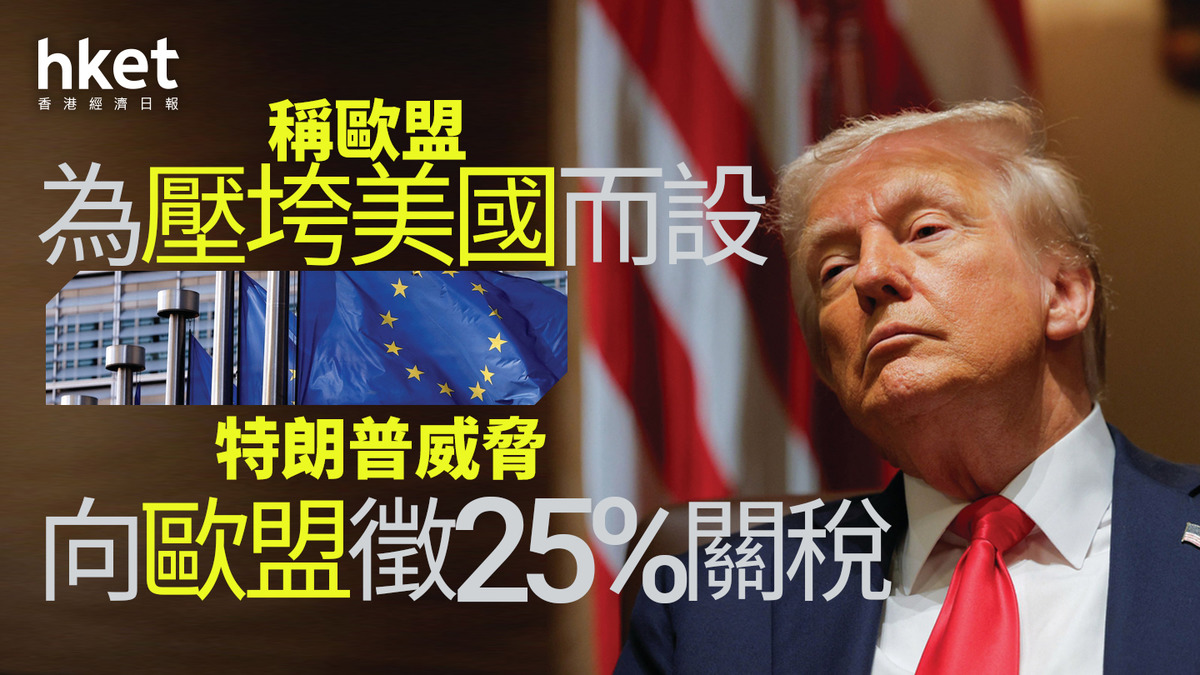## Detailed Analysis: Trump Threatens 25% Tariffs on EU Imports
Introduction
In a recent statement, former U.S. President Donald Trump has threatened to impose a 25% tariff on imports from the European Union (EU), alleging that the EU was formed to “screw the United States.” This move, if implemented, could have significant economic and political implications for both the U.S. and the EU.
Background
The European Union is a political and economic union of 27 member states that are located primarily in Europe. It was established to promote economic integration and cooperation among its member countries. The EU is one of the world’s largest economic powers, and it has a complex trade relationship with the United States.
Trump’s Statement
Trump’s statement reflects a long-standing perception among some U.S. policymakers that the EU’s economic policies are unfair to the U.S. This includes concerns over trade deficits and what some see as protectionist policies by the EU. However, the claim that the EU was formed to “screw the United States” is not supported by historical evidence. The EU’s primary goals have been to promote peace, stability, and economic integration among its member states.
Economic Implications
Imposing a 25% tariff on EU imports would likely have several economic consequences:
– Trade Disruption: Such tariffs could disrupt trade flows between the U.S. and the EU, potentially leading to higher prices for consumers and reduced competitiveness for businesses.
– Retaliation: The EU might retaliate with its own tariffs on U.S. goods, further escalating trade tensions and potentially harming both economies.
– Impact on Specific Industries: Certain industries, such as automotive and aerospace, could be particularly affected due to their significant trade volumes between the U.S. and the EU.
Political Implications
Politically, Trump’s threat could strain relations between the U.S. and the EU. The EU has historically been a key ally of the U.S., and any significant trade conflict could undermine this relationship. Additionally, such actions might be seen as part of a broader trend of protectionism and could influence global trade policies.
Conclusion
Trump’s threat to impose tariffs on EU imports reflects ongoing tensions in U.S.-EU trade relations. While the statement is controversial and not grounded in the EU’s founding principles, it highlights the complexities and challenges in managing international trade agreements.
—
Professional Report
#
Executive Summary
This report analyzes the implications of former U.S. President Donald Trump’s threat to impose a 25% tariff on imports from the European Union. The statement, which claims the EU was formed to harm the U.S., lacks historical basis but reflects ongoing trade tensions. The potential economic and political impacts are significant, including trade disruption, retaliation, and strained U.S.-EU relations.
#
Detailed Analysis
##
Economic Implications
1. Trade Disruption: A 25% tariff would increase costs for U.S. consumers and businesses, potentially leading to reduced demand and economic slowdown.
2. Retaliation: The EU is likely to respond with its own tariffs, escalating trade tensions and affecting both economies negatively.
3. Industry Impact: Sectors like automotive and aerospace could face significant challenges due to their reliance on U.S.-EU trade.
##
Political Implications
1. Strained Relations: Such actions could undermine the historically strong alliance between the U.S. and the EU.
2. Global Trade Impact: This move might encourage other countries to adopt protectionist policies, altering global trade dynamics.
#
Recommendations
– Diplomatic Engagement: Encourage dialogue between U.S. and EU leaders to resolve trade disputes through negotiation rather than tariffs.
– Economic Diversification: Businesses should consider diversifying their supply chains to mitigate potential trade disruptions.
– Policy Review: Review existing trade agreements to identify areas for improvement and ensure fairness for all parties involved.
#
Conclusion
Trump’s threat highlights the need for careful management of U.S.-EU trade relations. A balanced approach that addresses concerns while maintaining cooperation is crucial for economic stability and political harmony.
Related sources:
[1] www.youtube.com











